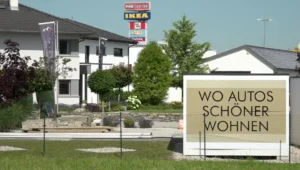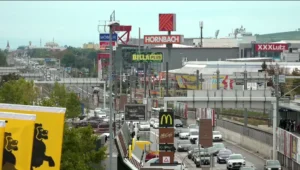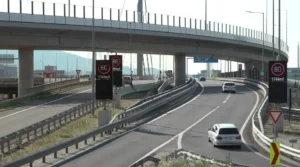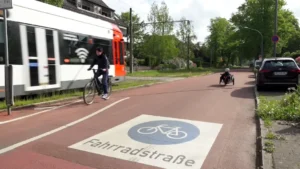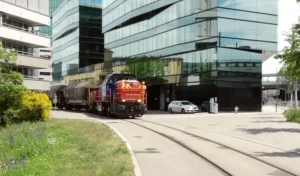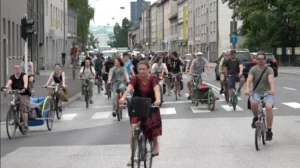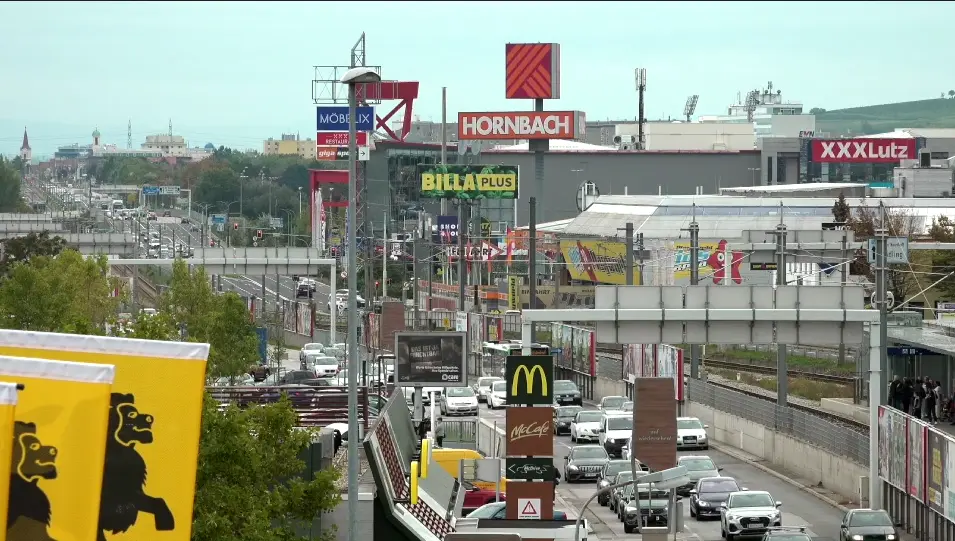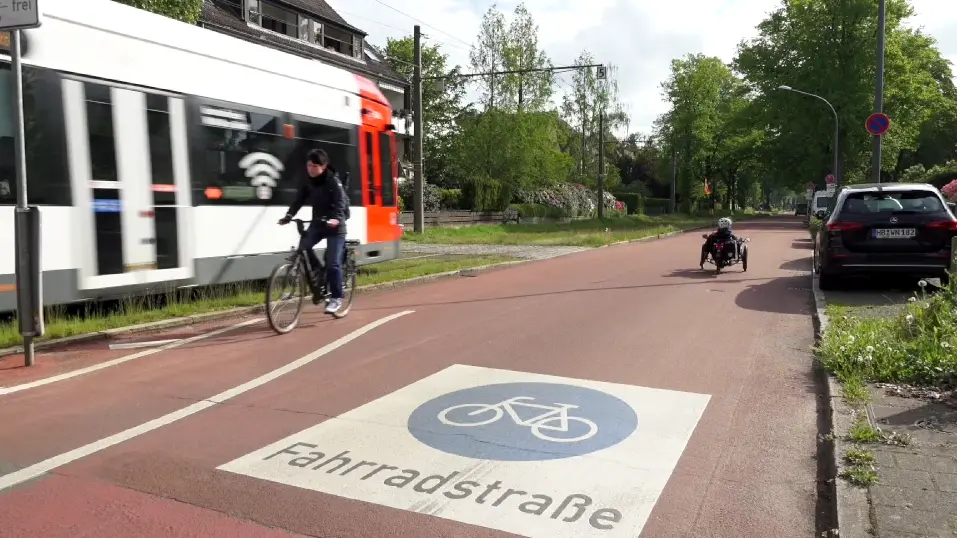
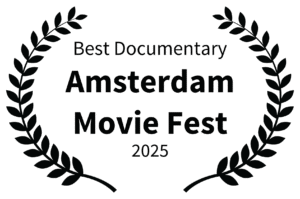









The Automotive Human
A society gone astray
and ways to get it back on track
The construction and mobility sector is by far the biggest driver of climate change. What is built where, the resulting mobility requirements and how we meet them are therefore questions of crucial importance for our future — both in terms of climate protection and far beyond. The vast quantities of land consumed by our car-dependent housing developments and the desolation of many town and village centres are further instances of the damage caused by motor vehicle traffic, as is the fragmentation of the landscape by ever more new roads — to the point where it is becoming dangerous for people and nature alike. At the same time, however, transport is very much a sector where policymakers are extremely shy of radical change. Nowhere do industry's habits die harder than here when it comes to ingrained ways of doing things.
And yet in the German-speaking region alone there are plenty of examples that demonstrate how things can be done perfectly well, indeed significantly better, with far fewer motor vehicles: not only in cities, but in suburban and rural areas too; in commuter and commercial transport as well as in shopping and leisure traffic, and even in sectors like tourism and agriculture. Nevertheless, the convenience of unrestricted automobility appears to come at the cost of mental flexibility: wide sectors of the population, not to mention politicians, government officials and the media, are unable or unwilling to even imagine alternatives to mass motor vehicle transport, be it for people or goods. Instead, we're attracted by future technologies that promise to let us carry on with our present "way of life", or rather "way of drive".
As well as presenting compelling examples of best practice from Austria, Germany and Switzerland, South Tyrol, Liechtenstein and Luxembourg, the film also throws light on the interests and motives behind the "automotive system" and presents examples — some shocking, some absurd — of political and corporate denial and whitewashing. The film is thus primarily aimed at civil society, to raise people's awareness of the fact that it would be perfectly feasible to find a way out of the "mobility trap" we're stuck in — right now, and at a reasonable cost. And we could do it not by imposing undue limitations, but by creating a better life in future-proof towns and villages.
With funding from Forum Wohn-Bau-Politik, Bundesministerium für Kunst, Kultur, öffentlichen Dienst und Sport, Ministerium für Mobilität und öffentliche Arbeiten Luxemburg, Bundeskammer der Ziviltechniker:innen I Arch+Ing, Baukultur Nordrhein-Westfalen, Land Kärnten – Kultur, Land Kärnten – Raumordnung, Land Oberösterreich – Kultur, Land Oberösterreich – Umwelt, Land Oberösterreich – Direktion Straßenbau und Verkehr, Land Salzburg – Kultur, Land Steiermark, Land Vorarlberg, Land Tirol, GemNova, Stadt Graz, Stadt Salzburg, Stadt Wien – Kultur, Österreichischer Städtebund, Autonome Provinz Bozen-Südtirol – Amt für Film und Medien, Stadt Zürich, Stadt Luzern, Stadt Winterthur, Stadt Schaffhausen, Kanton Basel-Stadt, Kanton Freiburg, Kanton St. Gallen, Kanton Nidwalden, Öffentlicher Verkehr der Region Lausanne, Gemeinde Vaduz, Freie Hansestadt Bremen, Landeshauptstadt Düsseldorf, Stadt Köln, Stadt Mannheim, Stadt Heidelberg, Stadt Ulm, Stadt Regensburg, Stadtwerke Augsburg, Großraum-Verkehr Hannover, Mobility Genossenschaft, Kärntner Linien, Verkehrsverbund Steiermark, Verkehrsverbund Vorarlberg, Innsbrucker Verkehrsbetriebe, Wiener Linien, Zillertalbahn, Steiermarkbahn, Stern & Hafferl Verkehrsgesellschaft, Graz-Köflacher Bahn und Busbetrieb Gesellschaft, Albtal-Verkehrs-Gesellschaft & Karlsruher Verkehrsverbund, Plasser & Theurer, Frauscher, Rhomberg, Kallinger Projekte, Metron, LGT Private Banking, Österreichische Hagelversicherung, SWISSRAIL Industry Association, Verband öffentlicher Verkehr, umverkehR, Städtekonferenz Mobilität, EspaceSuisse – Verband für Raumplanung, LITRA – Informationsdienst für den öffentlichen Verkehr, Institut für Raumentwicklung I OST Ostschweizer Fachhochschule, Schweizerische Vereinigung der Verkehrsingenieure und Verkehrsexperten, Stiftung Corymbo, Fondation Sotto Voce, VCS Verkehrs-Club der Schweiz, VCL Verkehrs-Club Liechtenstein
Information for film event organisers
Put together your own version of the film! This documentary consists of 25 modular chapters that can be combined at will. That means you can put together selected chapters of the six-and-a-half-hour film to create your own tailor-made version, placing the emphasis on particular regions and/or issues and defining the length of the film as required. The running length should not be less than 90 minutes. The director is also happy to suggest a customised version for your purposes. Click here for a list of all the chapters.
Hold a discussion with the director! On request, urban planner and film-maker Reinhard Seiss is happy to participate in discussions with the audience and/or local experts about the film and the issues it addresses.
Design your own film poster! You can download the film poster here in A1 or A2 format, insert details of your screening event, save it as an "optimised PDF" and print it out for local use. Or, if you prefer, a neutral version of the film poster in A1 or A2 format is available here. On request, we're also happy to send you a ready-designed invitation card that can be adapted for your own purposes in the same way.
Technical data
- Duration of film
- modular, 90 to 200 min
- Film resolution
- 4K
- Film file format
- preferably DCP
- Film delivery
- preferably via WeTransfer
Film screening — fixed costs
- Film licensing fee
- EUR 500 (for 2 screenings)
- Customised version of film
- EUR 50 flat rate for individual customised selection of film chapters
- Film delivery
- EUR 15 flat rate for online delivery (WeTransfer) or accrued shipping costs (outward & return) for delivery of a hard disk
- Registration for film music royalties
- with AKM (Austria), GEMA (Germany), SUISA (Switzerland) or the royalty collection body for your country
Film screening — optional costs
- Film discussion fee
- EUR 500 for director's participation in film discussion
- Travel costs
- Director's travel and overnight costs (in case of a cohesive "tour" in a particular region the travel costs are divided among several event organisers)
Press texts
500-character press text
The Automotive Human
A society gone astray and ways to get it back on track
Director: Reinhard Seiss, Vienna 2025, modular, 90—200 min
The latest documentary from urban planner Reinhard Seiss is a stirring appeal for a radical transport transition as an essential prerequisite for serious climate protection. With compelling examples from across the entire German-speaking region, the film shows that we can function perfectly well with far fewer cars. On the other side of the coin, it also shows how political opportunism and economic lobbying, paired with an unquestioning belief in technology and a fixation on growth, stand in the way of a turnaround.
Further information and DVD sales at www.urbanplus.at
1,000-character press text
The Automotive Human
A society gone astray and ways to get it back on track
Director: Reinhard Seiss, Vienna 2025, modular, 90—200 min
This documentary by urban planner Reinhard Seiss is a stirring appeal for a radical transport transition going far beyond the current policy goals. According to Seiss, such a transition is imperative if efforts to protect the climate as well as conserve land and resources are to have any hope of success.
His documentary explores the spatial, ecological, economic and social aspects of mobility and transport and exposes the direct and indirect drivers of "the automotive system": decision-makers and profiteers from politics and industry, the legal and financial frameworks that underpin our mobility systems — and, last but not least, town planning and urban development as the simultaneous cause and effect of traffic flows.
With compelling examples of best practice from across the entire German-speaking region, the film shows that both people and the economy can function perfectly well with far fewer cars. On the other side of the coin, it also shows how political opportunism and economic lobbying, paired with an unquestioning belief in technology and a fixation on growth, stand in the way of a turnaround.
Further information and DVD sales at www.urbanplus.at
1,500-character press text
The Automotive Human
A society gone astray and ways to get it back on track
Director: Reinhard Seiss, Vienna 2025, modular, 90—200 min
The latest documentary from urban planner Reinhard Seiss is a stirring appeal for a radical transport transition going far beyond the current policy goals. According to Seiss, such a transition is imperative if efforts to protect the climate as well as conserve land and resources are to have any hope of success.
His documentary explores the spatial, ecological, economic and social aspects of mobility and transport and exposes the direct and indirect drivers of "the automotive system": decision-makers and profiteers from politics and industry, the legal and financial frameworks that underpin our mobility systems — and, last but not least, town planning and urban development as the simultaneous cause and effect of traffic flows.
With compelling examples of best practice from across the entire German-speaking region, the film shows that both people and the economy can function perfectly well with far less car traffic. On the other side of the coin, it shows how our "robber economy", despite its claims of sustainability, is preventing a transport transition with its unquestioning belief in technology und fixation on growth.
The numerous examples presented by Seiss — some shocking, some absurd — of political and corporate denial and whitewashing are often so striking that viewers can do nothing but laugh and/or shake their heads in disbelief. The film's pointed commentaries provide plenty of occasion for both. What remains is the realisation that in transport, nothing needs to be the way it is. And that this shift towards future-proof mobility is only likely to happen if people take the initiative themselves.
Further information and DVD sales at www.urbanplus.at
2,500-character press text
The Automotive Human
A society gone astray and ways to get it back on track
Director: Reinhard Seiss, Vienna 2025, modular, 90—200 min
The latest documentary from urban planner Reinhard Seiss is a stirring appeal for a radical transport transition as an essential prerequisite for serious climate protection, and likewise a call for much-needed conservation of land and other resources. The construction and mobility sector is by far the biggest driver of climate change — not to mention the general over-exploitation of our planet and its resources. What is built where, the resulting mobility requirements and how we meet them are thus questions of crucial importance for our future. At the same time, however, transport is very much a sector where policymakers are extremely shy of radical change. Nowhere do industry's habits die harder than here when it comes to ingrained ways of doing things.
And yet in the German-speaking region alone there are plenty of examples that demonstrate how things can be done perfectly well, indeed significantly better, with far fewer motor vehicles: not only in cities, but in suburban and rural areas too, and in passenger as well as freight transport. Nevertheless, the convenience of unrestricted automobility appears to come at the cost of mental flexibility: a lot of people are unable or unwilling to even imagine alternatives to mass car travel. Instead, we're attracted by future technologies that promise to let us carry on with our present "way of life", or rather "way of drive".
As well as presenting compelling examples of best practice from Austria, Germany and Switzerland, South Tyrol, Liechtenstein and Luxembourg, the film also throws light on the interests and motives behind the "automotive system": decision-makers and profiteers from politics and industry, the legal and financial frameworks that underpin our mobility systems — and, last but not least, town planning and urban development as the simultaneous cause and effect of traffic flows. The examples — some shocking, some absurd — of political and corporate denial and whitewashing are often so striking that viewers can do nothing but laugh and/or shake their heads in disbelief. The film's pointed commentaries provide plenty of occasion for both.
What remains is the realisation that in transport, nothing needs to be the way it is, and that it would be perfectly feasible to find a way out of the "mobility trap" we're stuck in — right now, at a reasonable cost and without imposing undue limitations. However, it is equally evident that the transition towards future-proof mobility is only likely to happen if the public initiate it themselves.
Further information and DVD sales at www.urbanplus.at
Press Images
If you require the images (copyright: URBAN+) in a higher resolution, please contact us via urban.plus@gmx.at.
